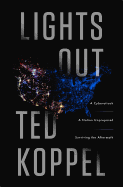
Ted Koppel (Off Camera) is a broadcast news icon. In Lights Out, his first book of investigative journalism, he builds a strong case that a cyber attack on U.S. electrical power grids is likely, potentially devastating, and that the government has failed to prepare for it.
Cyber attacks may come from nations or small groups, and are deniable in ways that a nuclear attack is not, which means that attackers need not fear immediate retaliation. Koppel refers to a Federal Energy Regulatory Commission analysis that found that "if nine of the country's most critical substations were knocked out at the same time, it could cause a blackout encompassing most of the United States." It might be tempting to dismiss these extreme scenarios as fearmongering, if it weren't for Koppel's reliance on reams of studies and reports, and interviews with top-ranking national security experts and policy makers from all levels of government and industry, including power company officials, the military, NSA, FEMA and Homeland Security.
Lights Out is suffused with the anxiety that comes from trying to predict an uncertain future. Readers may want to retreat from this mass of alarming facts and figures. However, Koppel offers British World War II civil defense measures of his childhood as an example of national training that put "an organized structure in place. There was a level of civilian discipline that served the country well." No matter what disasters come our way, he believes we could benefit from building prepared communities and a national emergency plan to hold society together until the lights come back on. --Sara Catterall

